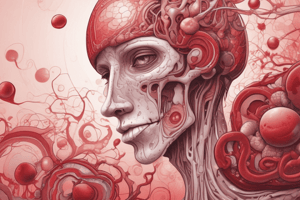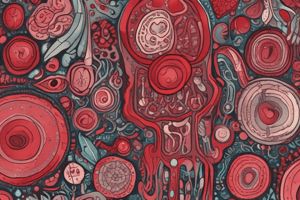Podcast
Questions and Answers
Drinking moderate amounts of alcohol can help increase red blood cell production.
Drinking moderate amounts of alcohol can help increase red blood cell production.
False (B)
People over age 40 are at increased risk of anemia.
People over age 40 are at increased risk of anemia.
False (B)
Folic acid can be found in citrus fruits and juices.
Folic acid can be found in citrus fruits and juices.
False (B)
Iron deficiency anemia cannot be prevented.
Iron deficiency anemia cannot be prevented.
Severe anemia can cause a slow heartbeat.
Severe anemia can cause a slow heartbeat.
Anemia can lead to a reduced heart size.
Anemia can lead to a reduced heart size.
Pregnant people with folate deficiency anemia are at risk of having twins.
Pregnant people with folate deficiency anemia are at risk of having twins.
Some inherited anemias can be cured with medication.
Some inherited anemias can be cured with medication.
Losing a small amount of blood quickly can cause severe anemia.
Losing a small amount of blood quickly can cause severe anemia.
A healthy diet includes foods rich in vitamin A to prevent anemia.
A healthy diet includes foods rich in vitamin A to prevent anemia.
Flashcards are hidden until you start studying
Study Notes
Risk Factors for Anemia
- Having a history of certain infections, blood diseases, and autoimmune conditions increases the risk of anemia.
- Drinking too much alcohol, being around toxic chemicals, and taking some medicines can affect red blood cell production and lead to anemia.
- People over 65 are at increased risk of anemia.
Complications of Anemia
- Severe tiredness can make it impossible to do everyday tasks.
- Pregnant people with folate deficiency anemia may be more likely to have complications, such as premature birth.
- Anemia can lead to heart problems, including a rapid or irregular heartbeat, enlarged heart, or heart failure.
- Some inherited anemias, such as sickle cell anemia, can lead to life-threatening complications.
- Losing a lot of blood quickly can cause severe anemia and can be fatal.
Prevention
- Eating a healthy diet may prevent iron deficiency anemia and vitamin deficiency anemias.
- Foods rich in iron include beef, beans, lentils, iron-fortified cereals, dark green leafy vegetables, and dried fruit.
- Foods rich in folate include fruits, fruit juices, dark green leafy vegetables, green peas, kidney beans, peanuts, and enriched grain products.
- Foods rich in vitamin B-12 include meat, dairy products, and fortified cereals and soy products.
- Foods rich in vitamin C include citrus fruits, peppers, broccoli, tomatoes, melons, and strawberries, which also help the body take in iron.
Studying That Suits You
Use AI to generate personalized quizzes and flashcards to suit your learning preferences.




